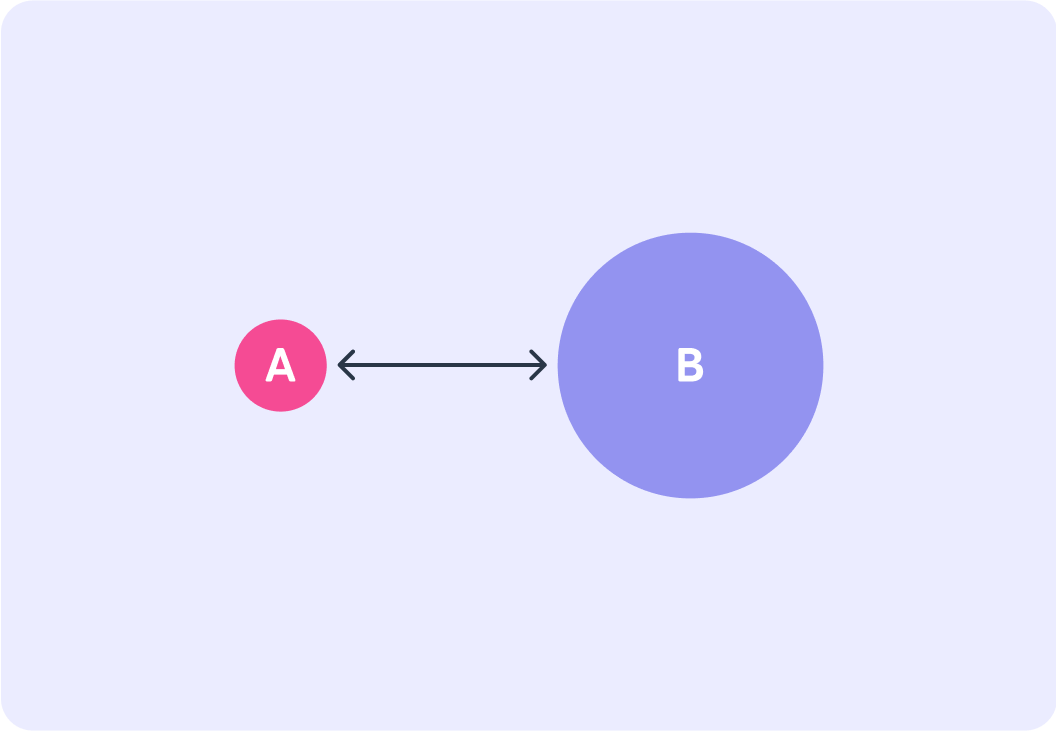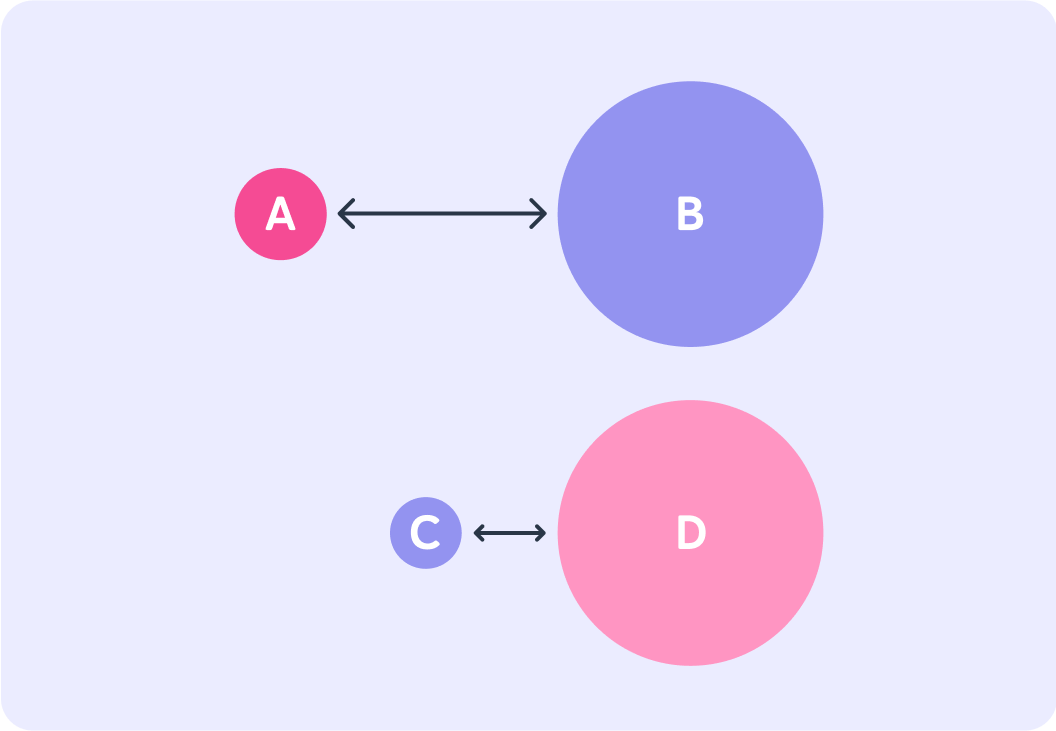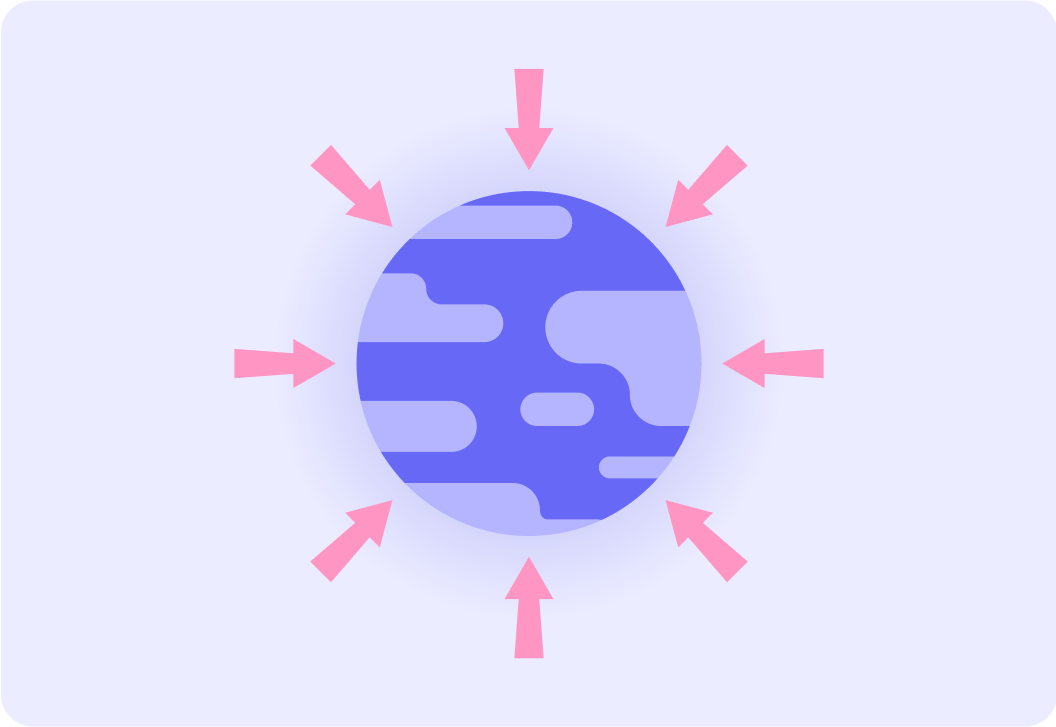YOU ARE LEARNING:
Gravity: It’s All Relative!

Gravity: It’s All Relative!
Gravity is what keeps us on the ground as well as what keeps planets going around the Sun.
What is gravity?

What type of force is gravity?

True or false? All objects have gravity - from the Earth itself to a duck feather.

To recap so far
Gravity...
is a force of attraction between two objects.
Gravity is a non-contact force...
which means the objects don't have to be touching for gravitational force to be exerted.
All objects have gravity...
from the most massive objects to the smallest objects in the Universe.
All objects have gravity
That means that all objects are essentially "pulling" at each other.

But not all objects are doing so equally. Which object do you think is winning this game of gravitational tug-of-war for example?
A) Object A B) Object B


Now, where is the gravitational force stronger, do you think?
A) Between objects A and B B) Between objects C and D


Which two things does the strength ** of the gravitational force between two objects depends on?

You can select multiple answers
Often the gravitational force that an object exerts is negligible in comparison to the gravitational force of another object.
True or false? The gravitational force of Earth is so large that your own gravity is not acting on Earth.

Even though you can't feel it, your gravitational force is acting on the Earth
It's just very very little compared to the Earth's gravitational force on you!
You could say that the force of your gravity acting on the Earth is ____________ compared to how much the Earth's gravitational force.

Where is the force of gravity stronger?

So essentially all objects in the Universe are exerting a force of attraction on you... your friend, Earth and Jupiter!
But here on Earth, the only force of gravity large enough for you to feel the affect of is from Earth itself. Your friend's gravity is negligible because their mass is far too small, and Jupiter's gravity is negligible because its too far away.
The gravitational field of an object...
describes what force another object would feel at a particular point in the field.

What unit do you use for force?


What is the SI unit for mass?


Gravitational field strength is force per unit mass
So the unit for gravitational field strength is N/kg.

The gravitational field strength at the surface of Earth is ______ N/kg.


So the Earth's gravitational field strength at its surface is 9.8 N/kg
This means that an object will experience around 10 Newtons of force for each kilogram of its mass.

If an object has a mass of 10 kg, how much force will it experience at the surface of the Earth?


What do we call the force that an object experiences due to Earth's gravity?

What do we really mean by weight?
Any object in a gravitational field will experience a force of attraction. In physics, this force is what we call an object's weight. What is the unit for weight?

An object on Earth will experience a force (weight) due to Earth's gravity. Will the same object experience the same force (weight) on the Moon?

What does the magnitude of the weight of an object on Earth depend on? Pick all the options you think are correct?

You can select multiple answers
The weight of an object is proportional to its own mass and the gravitational force it feels
If an object's mass is 10 kg and the gravitational field strength, g, is 9.8 N/kg, then the object's weight is 98 N.
What is the equation for weight, W?

So mass and weight are not the same thing!
Mass is measured in kilograms. Weight is a force that we measure in Newtons. It can be calculated as W=mg, where g is gravitational field strength.
Which object has a larger gravitational field strength, the Earth or the moon?


Remember that W=mg. What is the weight a 60 kg person on Earth?


Now say this person travels to the Moon, where the gravitational field strength is only 1.6N/kg. What will this person weigh on the moon?


Does the person's mass change when they travel to the Moon?


The mass of an object is the amount of matter in the object
So your mass does not change if you are on Earth or on the Moon. But your weight does because the gravitational field strength is different on the Moon compared to on Earth.

So mass and weight are not the same thing!
Weight is a force that we measure in Newtons. It can be calculated as W=mg, where g is gravitational field strength.
If your mass is 60 kg, then you weigh 60 kg×9.8 N/kg=588 N on Earth.

Summary
Gravity is a force of attraction between two objects
It depends on the two objects' mass and the distance between them.
The gravitational force of one object can be negligible in comparison to the force of another object
For example, the Earth's force of gravity on you is much larger than the force of gravity you exert on the Earth.
The gravitational field strength of Earth is the force per unit mass felt by an object due to Earth's gravity.
Earth's gravitational field strength isg=9.8N/kg.
